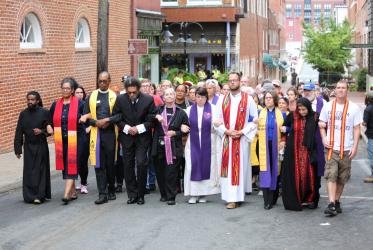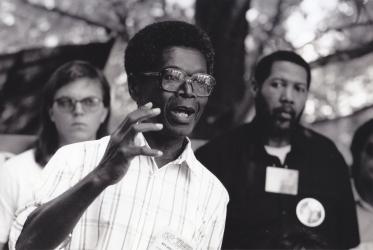The 15 October discussion set the stage for the conference by focusing on the centrality of racism in the experiences of Africans (on the continent or in the diaspora). Speakers and participants explored the manifestations of racism and how it is experienced by Africans in the different regions of the world.
Prof. Dr Isabel Apawo Phiri, WCC deputy general secretary for Public Witness and Diakonia, offered opening remarks that reflected on the WCC’s long history of fighting racism. “In fact, this year we are also celebrating the 50th anniversary of the WCC’s Programme to Combat Racism,” she said.
Rev. Dr Frank Chikane, moderator of the WCC Commission of the Churches on International Affairs, also moderated part of the discussion, which centered on four rounds of questions. “The issue of racism is central in our lives,” said Chikane. “What you are sharing rings a bell for me because these are common experiences.”
Chikane expressed appreciation for hearing perspectives from different regions. “It’s quite clear that racism comes in many formats and in many instances it’s concealed and made to look like it is normal,” he said. “That tells you how this is engraved in the minds of the people and the way in which they think.”
Rev. Dr Angelique Walker-Smith, a member of the WCC central committee who also moderated part of the discussion, gave an overview of the ways throughout history in which people of Africa and people of African descent have gathered, many pre-dating the creation of the WCC itself. “There is actually a long history here,” she said, adding her appreciation for the speakers who will help prepare for the Africa & African Diaspora Conference.
Dr Catherine S. Namakula, vice chair, UN Working Group of Experts on People of African Descent, highlighted the ways in which racism arises, and also reflected on the intersection of racism and environmental injustice.
“Where people of African descent live, there isn’t much work done in cleaning up the environment,” she said. “There is more toxic waste dumped in their areas. So we are talking about environmental justice for all races as well.”
Dr Dominique Day, chairperson of the UN Working Group of Experts on People of African Descent, talked of how racism has been used throughout history to rationalize colonialism. “To call a spade a spade, systemic racism is not made up of a global thing in the sky but the subjective decision-making of people with power—people with small amounts of power or large amounts of power,” she said.
Watch the morning session in french







